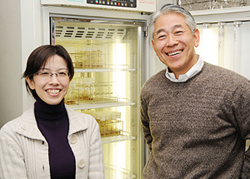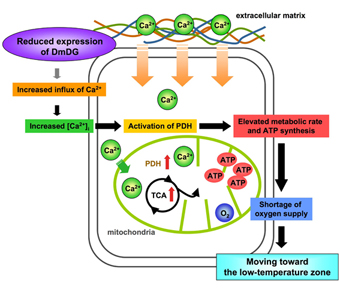Professor UMEDA, Masato; Assist Prof KATO, Utako “Changes in Temperature Preferences and Energy Homeostasis in Dystroglycan Mutants” (Published in “Science”, 27 March 2009)
|
Professor UMEDA, Masato; Assist Prof KATO, Utako (Laboratory of Supramolecular Biology, Division of Multidisciplinary Chemistry)
“Changes in Temperature Published in “Science”, 27 March 2009 |

Professor UMEDA, Masato (right) |
||
|
The earth has experienced several rounds of cooling and warming cycles, and organisms exposed to these climate changes either were exterminated or adapted to survive. Such climate challenges thus served as environmental pressures for selecting individuals who were able to survive under heated or chilled conditions. Animals have evolved thermoregulatory systems to adapt their physiological functions, such as energy utilization, growth, reproduction, and locomotion, in response to the wide range of changes in ambient temperature. Mobile animals commonly select a preferred temperature, using various strategies that include seasonal and diurnal migrations and a selection of the appropriate period of day for foraging and predation. In experimental thermal gradients, a wide variety of animals have been shown to move toward thermally comfortable zones of a remarkably narrow range, spending most of the time at their preferred environmental temperatures. One of the prominent aspects of the behavioral thermoregulation is that the preferred temperature differs from species to species as well as among individuals within species. Although recent progress has been made in the identification of molecules involved in thermal sensation, it is not evident how temperature-preference behavior has evolved and persisted in animal species, and little information is available about the biochemical and metabolic processes that underlie the behavioral thermoregulation. |
|||
| In the present study, we have conducted mutagenesis and screens for mutants with altered temperature preference inDrosophila melanogaster and identified a new cryophilic mutant, named atsugari(atu). Here we show that reduced expression of the Drosophila orthologue of dystroglycan (DmDG) induces a striking tolerance to cold as well as the low-temperature preference. A sustained increase in mitochondrial oxidative metabolism caused by the reduced expression of DmDG was shown to be responsible for the cryophilic phenotype of the atu mutant. Although most ectothermic animals do not use metabolically produced heat to regulate body temperature, this study clearly demonstrates that their thermoregulatory behavior is closely linked to the level of mitochondrial oxidative metabolism, and that a mutation in a single gene could induce a sustained change in energy homeostasis, thereby having striking effects on the thermal responses in ectotherms. | 
Schematic representation of biochemical processes caused by the decreased expression of DmDG |
||
 Institute for Chemical Research, Kyoto University
Institute for Chemical Research, Kyoto University International Joint Usage Research Center
International Joint Usage Research Center